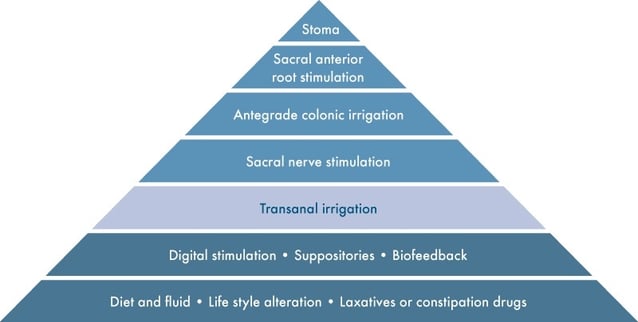"Completely changed my life" is how Ben* describes Transanal Irrigation (TAI). Having become paraplegic at age seven following the onset of the rare condition Ependymoma. Ben has lived alongside the terror of an incontinence accident ever since and wouldn't even have been able to work had he not been introduced to Transanal Irrigation. Now he can take part in all the regular pursuits of a young adult, but it hasn't been easy getting there.

The chances of spinal Ependymoma – cancerous cells forming on the spine or brain – occurring in children, and on the spine, is roughly is incredibly rare - just And the onset of symptoms came on without warning. After two weeks of radiating pain through his spine and legs, Ben's lower body became immobile over the course of one morning when he was seven years old. Ben was paraplegic from that day till nine years of age, on crutches from age ten to twelve and having dispensed with the crutches, he wore a diaper throughout his teenage years. The condition affected his bowel and bladder, over which he had no control. The associated fecal incontinence put the brake on the active social life of a teenager – his body would signal that involuntary leakage was on its way with only two minutes warning.
A straight forward activity that most of us may take for granted, like taking the bus to work, would have to be scrupulously planned, because his bowel was unreliable no matter how many precautions and preparations he put in place. Ben managed his bowel with diet and medications, living constantly in the shadow of a possible accident.
I would go to bed the night before work, worrying about the extra apple I had eaten that day. There were so many close calls when I took the bus to work the next morning.
|
If you have fecal incontinence, you may recognize some of these strategies: Ben has employed these methods for managing the bowel. Making yourself constipated. Many of you may recognize this strategy; many TAI users certainly do. On a week's long school visit to Ireland, Ben purposefully dehydrated himself and ate foods that would bring about constipation to counteract all the walking, and there was a lot of walking.
Laxatives Ben has used laxatives and found them unreliable – the body often becomes used to this method, resulting in the incomplete emptying of the bowel and sluggish evacuation. Diet And this was the method that Ben had to rely on. Any event and undertaking in Ben's life would require many days preparation – knowing that an exam was coming up on Friday morning, would require a weeks worth of strict diet planning – thankfully Ben loves fruit, but his condition has severely limited his choice of food, and did nothing to appease the anxiety of anticipating an accident during an exam. The Conservative methods pyramid – treatment offered to patients for bowel dysfunction
This pyramid is the orthodox recommendation of treatments in order of sequence, starting from the bottom. You can see that Ben has tried most of these methods, and that Transanal Irrigation is offered before more invasive and surgical interventions |
Life continued along these limitations. Ben has close, supportive friends and family, but he didn't go out that much, getting to work was almost impossible on the bus with the risk attached, and he was resigned to a life dictated by his bowel.
Ben's first thoughts about Transanal Irrigation: "No way, there is no way I am doing that"
His nurse had heard about TAI and thought they might give it a try. At first, having learned what was involved – the introduction of water to the bowel to irrigate and empty, sounded strange and complicated. Tubes, a pump, a water container – it didn't look easy. No medication involved at least, but daunting none the less.
So how did Ben find his first irrigation?
There was a lot of poop! And the second time and the third time – my body responded very well to it
It's worth noting that it usually takes longer for the body to become accustomed to a new bowel regime which involves a training process supervised by a health care professional, and there are occasions when the user adopts the therapy with little difficulty.
Ben enjoys his life, work and all the regular pursuits of a young adult:
"Without TAI, I would never have been able to work full time.
Nowadays, I can go wherever I want, whenever I want"
* While our stories are true, user names and images may have been changed to protect their privacy. Thank you for understanding.







